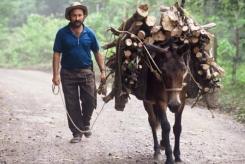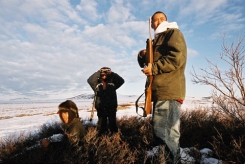Illegal Logging Takes Its Toll in the Amazon
April 18th, 2012
by Scott Wallace
Posted to National Geographic
New study says U.S. firms importing millions of dollars worth of ill-gotten timber
The timber industry in Peru is rife with corruption and illegality, and international buyers are complicit in a “well-oiled machine” that is plundering the Peruvian rain forest, endangering its rich biodiversity and undermining the welfare of indigenous communities, according to a major new study by the Environmental Investigation Agency (EIA).
Despite an ongoing overhaul of institutions charged with managing and protecting Peru’s sprawling forests, the system remains plagued by deception, cronyism, and weak enforcement, says the EIA report, The Laundering Machine: How Fraud and Corruption in Peru’s Concession System are Destroying the Future of Its Forests.
Though Peru holds the fourth-largest tropical forest land in the world, after Brazil, Indonesia, and the Democratic Republic of Congo, administrators in Lima have long regarded the country’s Amazonian region as a hinterland to be exploited for its gold, timber, and oil. The Peruvian jungles also harbor more than a dozen uncontacted indigenous tribes, many under mounting pressure from incursions by illegal logging crews into the deep backwoods in search of valuable timber.
EIA documented the widespread practice of drafting fictitious forestry management plans in order to obscure the true origin of timber that is often logged in protected areas, national parks, or lands for which logging no permits have been approved. Researchers confined their probe to two species — big-leaf mahogany (swietenia macrophylla) and cedar (cedrela odorata) — because they are protected by the Convention on International Trade in Endangered Species of Flora and Fauna (CITES), thus requiring specific export permits which made shipments easier to track. Under provisions of the 2007 U.S.-Peru Free Trade Agreement, U.S. buyers are responsible for possible illegalities incurred in the production of their wares even if they did not intend to purchase illegally produced goods.
Nonetheless, EIA says that 22 U.S. firms have imported millions of dollars worth of illegal harvested mahogany and cedar from Peru since 2008. Among the chief violators, according to the report, is Bozovich Timber Products (BTP) of Alabama, the largest U.S. importer of Peruvian timber. BTP is a subsidiary of the Bozovich Group, which also includes Maderera Bozovich, the largest wood products company in Peru.
“This investigation suggests that Peruvian authorities currently have little capacity to control what’s happening in their forests,” the report notes. EIA investigators describe a grim situation unfolding in Peru’s jungles, where a “catch-as-catch-can” attitude prevails among illegal loggers vying to reach stands of precious timber ahead of competitors.
Many of the study’s findings are consistent with my own observations on recent forays into the Peruvian rain forest, where a wave of illegal logging invasions has sown strife among indigenous communities in desperate need of basic services, pitting those willing to sell off trees to unscrupulous lumberjacks, usually at pennies on the dollar, against those opposed to the plunder.






























